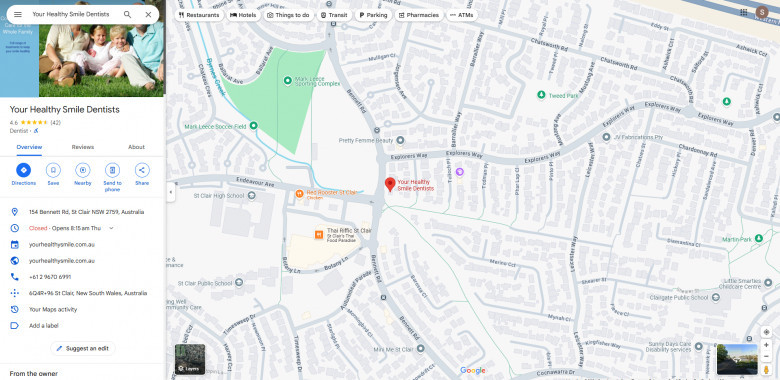views
Signs Your Dentist Should Check: Early Warnings of Dental Problems
When it comes to maintaining good oral health, prevention is always better than cure. Dental issues often develop quietly, showing only subtle signs before turning into major problems. Regular dental check-ups can help catch these early warnings before they escalate, potentially saving you from discomfort, time, and costly treatments. Whether you’re visiting your local dentist Mt Druitt or anywhere else in Australia, being aware of the early signs of dental trouble can make a big difference to your oral well-being.
1. Persistent Bad Breath or Unpleasant Taste
It’s normal to experience morning breath or temporary odour after eating strong-smelling foods. However, if bad breath persists despite brushing, flossing, and using mouthwash, it could be a sign of underlying problems like gum disease, decay, or infection. Similarly, a constant bad taste in your mouth may indicate the presence of bacteria or a failing dental filling. Your dentist Mt Druitt can help diagnose the source and suggest the appropriate treatment.
2. Bleeding or Swollen Gums
If your gums bleed when you brush or floss, don’t ignore it. While it might seem minor, bleeding gums are often the first sign of gingivitis – the early stage of gum disease. Left untreated, this can progress into periodontitis, a serious condition that can lead to tooth loss. Swollen, red, or tender gums also signal inflammation, which warrants a dental check-up.
3. Tooth Sensitivity
Experiencing sharp pain or discomfort when consuming hot, cold, or sweet foods and drinks can indicate tooth sensitivity. While some people have naturally sensitive teeth, sudden or worsening sensitivity may point to issues like worn enamel, tooth decay, gum recession, or even a cracked tooth. Getting it assessed early by your dentist Mt Druitt can prevent further damage.
4. Toothache or Jaw Pain
Any form of toothache – whether dull or sharp – should not be ignored. Pain is your body’s way of signalling that something is wrong. It could be due to cavities, infection, or an abscess. Likewise, jaw pain or stiffness can indicate temporomandibular joint (TMJ) disorders, teeth grinding (bruxism), or impacted wisdom teeth. Prompt diagnosis and treatment can prevent complications.
5. Changes in Tooth Colour
Discolouration doesn’t just affect your smile’s appearance – it can also suggest internal damage. Yellowing may result from lifestyle factors like smoking or drinking coffee, but grey or black discolouration could mean tooth trauma or decay. Any sudden or unusual change in tooth colour should be examined by a professional.
6. Mouth Sores That Don’t Heal
Occasional mouth ulcers are common and usually heal on their own within a week or two. However, sores that persist or frequently return might indicate an underlying problem such as an infection, irritation from dental appliances, or in rare cases, oral cancer. If a sore spot doesn’t improve within two weeks, book an appointment with your dentist Mt Druitt.
7. Loose or Shifting Teeth
Adult teeth should not move around. If you notice a tooth feels loose or your bite suddenly feels different, it may indicate bone loss from gum disease or trauma. This can lead to tooth loss if not addressed quickly. Early intervention can help stabilise the affected area and preserve your smile.
8. Dry Mouth
A persistently dry mouth can be more than just annoying – it can increase your risk of decay and gum disease. Saliva plays a crucial role in neutralising acids and washing away food particles. Chronic dry mouth can be caused by medication, dehydration, or medical conditions. Your dentist can recommend solutions to relieve symptoms and protect your teeth.
9. White Spots on Teeth or Gums
White spots on your teeth can be early signs of enamel demineralisation, which often leads to cavities. On the gums, white patches might suggest an infection or other oral health condition that requires further investigation. Early detection allows for more conservative treatment options and better outcomes.
10. Clicking or Popping Jaw
If your jaw clicks or pops when you open or close your mouth, it could be a sign of TMJ dysfunction. While not always painful, this condition can lead to discomfort, headaches, and difficulty chewing if left untreated. A dental professional can assess the cause and suggest therapy or appliances to relieve symptoms.
In summary, being proactive about your oral health means staying alert to the subtle signs that something might be wrong. From bleeding gums to persistent bad breath, these symptoms are your body’s way of alerting you to potential dental issues. Visiting your dentist Mt Druitt for regular check-ups and acting promptly on warning signs can help you maintain a healthy smile for life. Don’t wait until the pain is unbearable – your future self will thank you for taking action early. Regular dental care, combined with good oral hygiene habits at home, is the key to preventing long-term damage. So, if you’ve noticed any of these signs, it’s time to schedule an appointment and take charge of your oral health today.
Your Healthy Smile Dentists
154 Bennett Rd,
St Clair NSW 2759,
Australia
612 9670 6991




Comments
0 comment